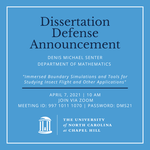Biography
Mathematical modeling, data analysis, and machine learning have been the major themes of Michael’s academic endeavors. The through line of his career has been the utilization of coding to solve computationally complex problems.
Michael enjoys mentoring and teaching. His teaching philosophy is based on his own experience - that a passion for math and computer science can be cultivated through active learning and emphasizing small victories.
Michael is originally from Nuremberg, Germany where he attended the Neues Gymnasium Nuernberg, a school following the humanist tradition of education. He now lives in Lexington with his family, where he enjoys travelling, collecting books, and reading nerdy webcomics in his spare time.
Interests
- Data Cleaning and Preparation
- Missing Data Methods
- Big Data and Data Analytics
- Causal Inference
Education
-
PhD in Applied Mathematics, 2021
University of North Carolina at Chapel Hill
-
Grad. Certificate in Bioinformatics and Computational Biology, 2021
University of North Carolina at Chapel Hill
-
Grad. Certificate in BD2K Data Science, 2021
University of North Carolina at Chapel Hill
-
BSc in Mathematics, 2015
University of Utah
